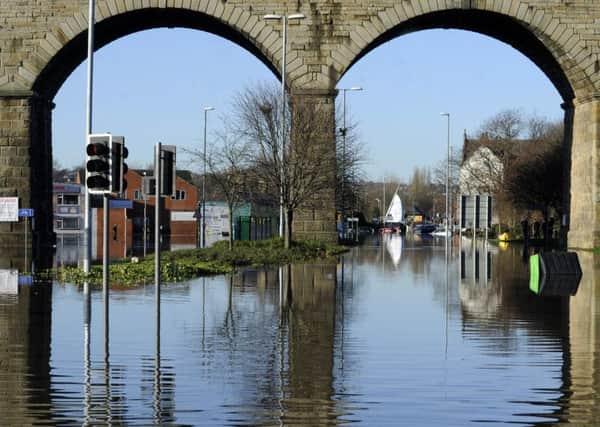Flooded businesses in Calder Valley and Leeds with no insurance in 'lap of the gods'


A two-centuries-old steel business hit by rising water in the Calder Valley has been left “in the lap of the gods” as it remains unprotected unless they chip in to build a £250,000 flood defence. In the Kirkstall area of Leeds, one business was turned down 13 times by insurance companies while another faces an excess of £25,000. The finance director of Pulman Steel in Sowerby Bridge, Chris Horner, said: “At the moment we are in the lap of the gods. Anyone who says the insurance market for businesses is working is talking utter nonsense. There just doesn’t seem to be anybody within the insurance industry that is being pro-active about our situation. Nobody is saying ‘we are going to help’. “I’m not so blind to think insurance companies are charities, they are multi-national businesses, they are global companies, but it just feels like we are swimming against a tide.” The MP for Halifax, Holly Lynch, said any belief that the insurance market is adequately meeting the needs of businesses is misguided. Today, she has written to Environment Secretary Andrea Leadsom asking the Government to ensure companies affected by the floods can get affordable cover in the future. The problem has surfaced after companies across the region try to renew their policies. While many firms received a payout for their losses on time which helped them get back on their feet, six months on from the catastrophic storms, insurers are reluctant to take on businesses again. In the meantime, it is understood some have changed their rules on underwriting policies for flood hit-premises. Pulman Steel in the Calder Valley was turned down by 10 insurance companies when they tried to renew their policy after £1m of damage was caused in this winter’s floods. They were insured once again by their original company, but this time they will only be covered if they pay half of the costs for a £250,000 flood defence scheme near their business. The proposal to increase the height of walls near the River Calder still has to be signed off by the Environment Agency, and even then the insurance company would only pay out if Pulmans meets an excess of £50,000. Mr Horner said: “We are very worried about the weather until we get the flood defences in place we will remain worried.” Asked how the company would fare financially if they flood again, he said: “If we don’t get the level of insurance needed in the next six months it wouldn’t quite be shut-up-shop time but we need some help. It would be nice if the Government could underwrite the insurance but they aren’t going to do that.” Huw Evans, the Director General at the Association of British Insurers, told the Environment, Food and Rural Affairs Select Committee in June that the problem for small and medium-sized businesses getting insurance is of a small scale. However he suggested the Government could help in the following ways: - Offer businesses a fixed pay-out scheme as is in place for the export finance industry. - Create a new insurance scheme for flood-hit businesses that mirrors the academies insurance programme. Although there was a functioning market, the Government stepped in to offer cheaper rates for schools. - Increase Government investment in flood defences across the country which they believe has been historically under-funded. A spokesperson from The Department for the Environment, Food and Rural Affairs, said: “We are committed to helping communities get back on their feet after last winter’s devastating floods. We are investing £52m in flood protection for communities in the Calder Valley and we will publish the Calderdale Catchment Plan outlining future defences later this year. “We also want everyone to have access to affordable flood insurance - that’s why we’re working across Government, with the insurance industry and other business representatives, to discuss further options for small businesses.” Since Storms Desmond and Eva the Government has paid out over £250 million to help householders and businesses can get back on their feet. However they say that the insurance industry is trying to produce a specific product for businesses in the Autumn. The Flood Re scheme which makes sure people living in flood prone properties can get affordable insurance is not easily extended to businesses, experts have said.